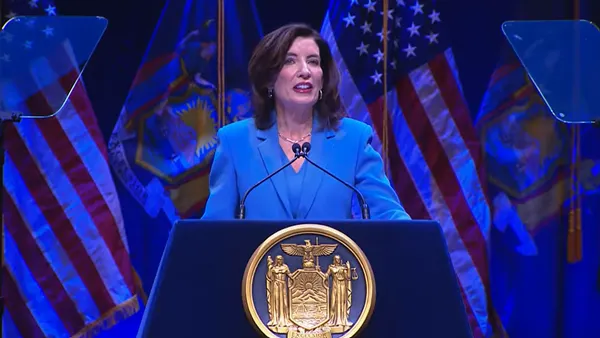Dive Brief:
- The Science Based Targets initiative, an organization that validates whether corporations’ net-zero goals align with climate science, is calling on financial institutions to participate in a pilot of its net-zero guidance for the sector, SBTi said Wednesday.
- Financial institutions will pilot a draft of SBTi’s Financial Institutions Net-Zero Standard, which SBTi said it will release by the end of July. The pilot will last for at least six weeks, though the targets that participating institutions develop through this process will not serve as “formally validated” science-based goals.
- SBTi tightened near-term target-setting standards for financial institutions in May, but the organization’s FINZ standard aims to eventually replace that slimmer guidance and provide institutions with near- and long-term guidance, according to a reference document published Wednesday.
Dive Insight:
The first version of the organization’s net-zero standard for financial institutions will include a “conceptual framework” for the role financial institutions and their targets play “in contributing to global climate goals,” per SBTi’s reference document. Though institutions who pilot test the standard cannot use those as formally validated targets, SBTI said participants “may use insights gained during the pilot to formally submit targets for SBTi validation” following the pilot.
The new standard would update and expand SBTi’s approach to the sector by defining net-zero at the portfolio level, giving institutions a framework to address scope 3 emissions and providing additional guidance on financing or underwriting “long-lived high emitting assets,” such as fossil fuel infrastructure, per the reference document.
The initial standard will not cover all asset classes — with SBTi explicitly naming sovereign debt as an exclusion — but SBTi expects to provide later updates that include “some” of the initially absent asset classes. Later versions are also expected to include expanded requirements for which projects and activities are eligible to count against a corporation's net emissions and additional guidance for banking, asset managers and owners, private equity and insurance.
SBTi said financial institutions and their role in reaching net-zero are unique because they finance actions that contribute to emissions rather than exercising direct control. The target-setter said in a press release the guidance will allow the sector “to leverage their role as enablers and facilitators in the global economy, and drive the net-zero transformation.”
“[Financial institutions] play an important role in supporting the economy and achieving climate stability,” SBTi said in the reference document. “As owners and allocators of capital they can use their influence as lenders, investors and insurers, among many other roles, to help transform the economic activities they service to reach a state of net-zero emissions.”
Applications to participate in the pilot will remain open until Aug. 9, and the pilot will begin Aug. 19. A second public consultation will run roughly concurrently with the pilot, following its release, estimated to last into the third quarter of this year.
Afterwards, SBTi will redraft the standards and seek approval from its technical council. The final standards are estimated to reach the board adoption and publication phase some time in Q1 2025, according to an estimated timeline included in the reference document.










